C.A. Gray's Blog, page 26
September 16, 2022
Review of The Complete Tales of Winnie-The-Pooh
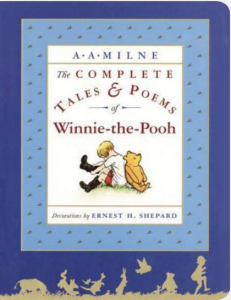
So endearing and delightful!
I’m not sure I even knew there was an actual book version of Winnie-the-Pooh–in my mind, he was kind of like Garfield, where various episodes existed here and there in various forms of media, but there wasn’t one single definitive text that started it all. This collection of short stories is just darling. Pooh is described as a “bear of very little brain.” Really nothing happens; the stories are very episodic, and character-driven. Pooh and his cast of quirky animal companions, plus Christopher Robin, just get it in their heads to set out on some minor task or adventure or another, and they reason with one another in their muddled or quirky ways how they might do this or that. I found myself grinning and laughing at many of the tales. The characters are so memorable, which is obviously why they’ve endured for so many decades.
Highly recommended for fluffy entertainment that will make you happy.
My rating: *****
Language: none
Sexual content: none
Violence: none
Political content: none
The post Review of The Complete Tales of Winnie-The-Pooh appeared first on C.A. Gray.
September 9, 2022
Review of The Three Musketeers
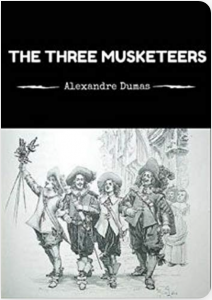
2018 review:
I read this about 15 yrs ago and remember really liking it… so why did I find it so boring now? I feel like this implies bad things about the progress of my attention span as I age…
—
2022 review:
I understand now. The first time I read “The Three Musketeers,” I read an abridged version. When I tried to read it in 2018, I attempted the unabridged, and Dumas had a tendency to be quite verbose (as did many of the classic authors, to be fair). The version I listened to this time was very abridged indeed, probably 6 hrs on audio. But because of that, the pacing really moved.
It’s odd that the title is “The Three Musketeers”–that’s misleading, as it leads one to believe that they are the main characters. Really, those three (Athos, Porthos, and Aramis) are barely distinguishable from one another as characters, D’Artagnan is the hero, really: a very young man who is all courage and emotion. He manages to challenge all three of these great Musketeers to a duel over various slights in the span of a single morning. The story tends to be quite flippant throughout: D’Artagnan doesn’t expect to survive but is hardly troubled by this. His manner so impresses the three that he promptly becomes their fourth. Subsequent intrigues follow, involving the suspicious king, the unfaithful queen, the queen’s lady in waiting, and various other high-ranking officials willing to use both information and the Musketeers as weapons against their political rivals. D’Argantan primarily gets mixed up in all this, falling in love at first sight with the queen’s lady in waiting, and then a femme fatale who was once married to one of his three companions before her true nature was revealed.
It’s a swashbuckling, almost tongue-in-cheek epic adventure, much in contrast to the very serious “Count of Monte Cristo.” I’m glad I gave it another go, but I’m also quite glad I went with abridged this time.
My rating: ****
Language: none
Violence: present but not gratuitous
Sexual content: present in a fade-to-black kind of way
Political content: none
The post Review of The Three Musketeers appeared first on C.A. Gray.
12 Rules for Life by Jordan Peterson
Today’s podcast review comes from this blog review of 12 Rules for Life.
The post 12 Rules for Life by Jordan Peterson appeared first on C.A. Gray.
September 2, 2022
Review of Jo & Laurie
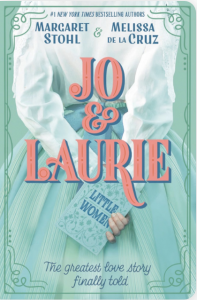
Oh!! I would give this 6 stars if I could! Before I get into the review of the story itself, some background: when I was in high school, I had this book I passed around to friends and family with a quirky question at the top of each page that each respondent was to answer. One of the questions was, “How do you feel about the fact that Jo didn’t end up with Laurie?” Because it was so traumatizing to me at the time. “Little Women” would have been one of my all-time favorite books, had Jo not refused Laurie… but because she did, the only other time I reread it was partial. I stopped after his proposal, so that I could pretend she accepted him later… and I never read it again.
Having listened to the afterword of this book, apparently I wasn’t the only one. I never realized that “Little Women” was actually published in two separate installments, nor that the story was based upon Louisa May Alcott’s real family and life (loosely), nor that in the interim between the two volumes, readers really did write her to say exactly what I felt: that Laurie and Jo must end up together. Reportedly she really did say that she wouldn’t marry Jo to Laurie for anything… which is quite peculiar, since apparently Laurie wasn’t exactly a real character in Alcott’s life, but was an amalgamation of several different people. So why not marry her off to him? That seems to suggest something quite interesting about Alcott’s own personality, since she of course identified with Jo.
This whole back story was the premise for this book, and it was so cleverly done. In it, what we know as volume one of “Little Women” has been published with Jo herself as the author. Her publisher is after her to write the second installment, in which she marries everyone off. She’s indignant about this, and attempts to do so but makes several false starts. In the interim, Laurie declares his love for her, and she rebuffs him–just as she ultimately ends up doing in the second volume (and this serves as her inspiration for writing it). Beth has already died even though apparently she only dies in volume 2 of “Little Women” — and Jo keeps trying to figure out how her story will end since she can’t bear to kill her off in fiction too. But because this retelling lives in a “meta” world, “Little Women” can still be what it is, while Jo’s “real” life can turn out quite differently. So all the things that I had hoped and later pretended might have occurred in the latter part of the original book really happened in this one. It’s predictable, of course: Laurie pines for her, and attempts to forget her by quickly getting engaged to someone else instead (not Amy this time, thankfully). Jealousy drives Jo to realize what she’s lost, and then she gets her second chance. I listened to the final scene three times, I kid you not. I’ve waited decades for this resolution! 
My rating: *****!!!
Language: none
Sexual content: none
Violence: none
Political content: very mild, nothing overtly woke
The post Review of Jo & Laurie appeared first on C.A. Gray.
The Count of Monte Cristo, Alexandre Dumas
Today’s podcast review comes from this blog review of The Count of Monte Cristo.
The post The Count of Monte Cristo, Alexandre Dumas appeared first on C.A. Gray.
August 26, 2022
The Ultimate Proof of Creation, Jason Lisle
Today’s podcast comes from this blog review of The Ultimate Proof of Creation.
The post The Ultimate Proof of Creation, Jason Lisle appeared first on C.A. Gray.
Review of 12 Rules for Life
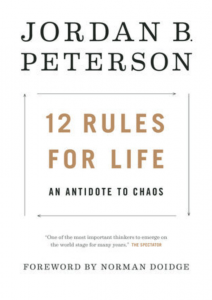
This was so good that after listening to it, I bought the kindle version so that I can highlight and take notes, and then journal about some of the points he makes to glean deeper insight and solidify the concepts. It’s interesting to me that I liked it so much now, since a few years ago when Peterson first became a YouTube sensation and others told me about him, I wasn’t all that impressed. At the time, I felt like what Peterson said was just common sense, and wasn’t worth getting all that worked up about.
Since then, I’ve started to listen to him again, perhaps with fresh eyes and new respect for all he’s suffered at the hands of cancel culture, and his courage to continue to speak reason and truth anyway. It was this integrity, I think, that intrigued me, and made me take a second look. He’s not selling something. He’s not trying to be an internet sensation, or a bestselling author, though ironically, due to the controversy surrounding him, he’s become both. He’s incredibly articulate, with a gift for putting words to concepts that seem nebulous to most but widely felt or recognized. But I think most intriguing of all, he seems to be on his own spiritual journey, and he’s humble and vulnerable enough to let us watch.
Peterson quotes an inordinate amount of scripture, more than any other philosophical or religious source, and reverently for the most part. But then he questions it, like a seeker who has not yet arrived at a comfortable position. He mythologizes and symbolically generalizes stories that the writers of scripture clearly intended literally–but he takes the main point from them anyway. As a result, his 12 Rules ultimately end up being very biblically consistent, backed up with his years of clinical practice and peppered with profound insight into human nature. These are what I intend to go back and ponder.
Definitely very well worth owning this one.
My rating: *****
Language: none
Sexual content: none
Violence: none
Woke content: none
The post Review of 12 Rules for Life appeared first on C.A. Gray.
August 19, 2022
Review of Sense and Sensibility
Today’s podcast comes from this blog review of Sense and Sensibility.
The post Review of Sense and Sensibility appeared first on C.A. Gray.
August 17, 2022
Review of The Count of Monte Cristo
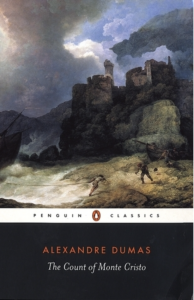
I read this many years ago, and gave it an easy 5 stars then as I recall… but, I read a paper copy rather than listening to it as I did this time, and I also read an abridged version the first time, whereas this time I listened to the entire unabridged version. Even so, it started off as quickly as I remembered, plunging me right into the story of Edmond Dantes at the height of his good fortune. He gets to enjoy it for all too short a time, as this is just the exposition. Three scoundrels conspire against him, during the time of the French Revolution, and he is condemned as a Bonapartist and thrown in the dungeon of the Chateau d’If. There he traverses all the emotions one might expect over a period of several years, of hope (knowing his innocence) and eventual despair, though he’s still ignorant of how he ended up in such a predicament. I wonder of Stephen King got the idea for “Shawshank Redemption” from “Monte Cristo,” as Edmond’s deux ex machina moment comes in the form of an elderly Abbe whose ingenuity enabled him to use what little tools he had available to him in order to dig himself to freedom–only to miscalculate and find that he had tunneled into Edmond’s cell instead. The Abbe is quite superhuman, not only for this feat but also for his encyclopedic genius in nearly every art and science known to man. He becomes Edmond’s tutor in the long subsequent years, training him in the confines of the dungeon to become an elegant and eloquent man of the world. He employs his brilliant mind in helping Edmond riddle out the secret of how he had been betrayed, and by whom. The Abbe also happened to have become privy to the secret of the great lost fortune of Cesare Borgia, and would have taken possession of it, had he not been thrown into prison before he could claim it. Then the Abbe dies, furnishing with Edmond with one final blessing: the means of escape in his shroud, posing as the dead man.
It’s only once Edmond recovers the fortune from the deserted Isle of Monte Cristo, styling himself as the Count of the same, that the unabridged version suddenly became quite apparent. Edmond’s elaborate revenge plot against the three perpetrators, plus one passive bystander who didn’t bother to help him, requires him to create multiple aliases. Several of the former perpetrators are now known by alternate titles as well, which made it hard to keep track of everyone. Also, there’s very little characterization, so I couldn’t use personality to keep the characters straight either. Eventually I had to go and read a list of characters from Spark notes to figure out who was who and how they were all related to each other–and it was much easier listening from that point on.
Monte Cristo (as he was called from the time he left the dungeons on, for the most part) suddenly becomes almost god-like from the time of his reemergence into society. He’s wealthy beyond anyone’s wildest dreams, he seems to be omniscient, perfectly worldly and wise in every way, and he considers himself an avenging angel, in the place of God. One wonders how the clueless Dantes could have become this all-powerful, all-knowing, invincible being… but we’re supposed to take it that the Abbe conferred all this and more in those brief years, with the aid of nothing but his formidable intelligence and memory. Even the narrator seems to believe in the absolute righteousness of Monte Cristo’s cause until the very end, when Monte Cristo himself begins to wonder if he’s gone too far. At least that.
The one family that Monte Cristo endeavors to be kind to is that of Morrel, his former boss who fought in vain for his release. Interestingly, Morrel himself dies at some point–I hardly remember when, as it was kind of a non-event–and from that point on, it’s mostly his son Maximillion whom Monte Cristo takes under his wing. Largely he tries to undo the irreparable harm that might have come to Maximillion in collateral damage, had Monte Cristo’s own revenge plot against one of the conspirators come to fruition. The way he goes about this, though, really suggests that Monte Cristo is both omniscient and omnipotent: he makes promises that no human could possibly keep, withholds information “for Maximillion’s good” that seems unspeakably cruel in the moment, and rationalizes that it will make him better appreciate his blessings later for having gone through such unnecessary misery–really as if he were in the place of God, to make such determinations (not that I think God does that sort of thing either, but some do, and evidently Dumas was one of them). Also, at the risk of a spoiler, Maximillion’s response on multiple occasions when it seems that he won’t get the woman he loves, for various reasons, is to threaten suicide. Really?! And nobody thinks this is extreme enough to rebuke him for such folly? This was also one of my major complaints with the “Twilight” series, though I guess it’s been a literary theme for quite some time.
My most recent memory of the story was also from the film version starring Jim Caviezel, so I was expecting the story to end the way the film did. It decidedly did not… and for once, I actually think (rather emphatically) that the film ending was better than the book’s. ***Spoiler alert*** In the film, even though Edmond’s fiancee Mercedes never stops loving him, she marries Fernand, not realizing that he is one of the conspirators against Edmond. She does this believing that Edmond is dead, or as good as dead. So far, all this happens in the book as well. But in the film, her son Albert turns out to also be Edmond’s son as well, not Fernand’s, and when Edmond takes his revenge, he gets his family back. In the book, even after his revenge and knowing Mercedes still loves him, Edmond lets her live out the rest of her life alone–I guess the implication is that he can’t forgive her for only waiting for him for a mere year before marrying his enemy, even though she didn’t realize that he was the enemy (and he was still imprisoned for another 13 years after that anyway). So instead of Mercedes, Monte Cristo ends up with a slave girl he’d “adopted”, whom he’d thought of as a daughter until almost the very end when he realizes she loves him. Not very satisfying.
So the broad strokes plot is fantastic, but at least in this reading, the details were less than perfect, in my estimation.
My rating: ****
Language: none
Sexual content: none
Violence: present but tame
Political content: none (historical only)
The post Review of The Count of Monte Cristo appeared first on C.A. Gray.
August 12, 2022
The Plus One Pact, Portia MacIntosh
This week’s podcast comes from this blog review, The Plus One Pact.
The post The Plus One Pact, Portia MacIntosh appeared first on C.A. Gray.



